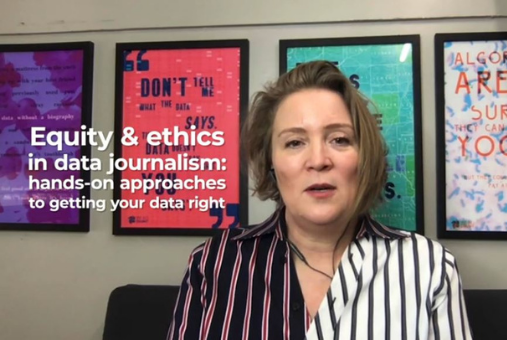Ethics has long been a cornerstone of good journalism, but its application to data journalism is new and still emerging. A recent Knight Center MOOC explored the ethics of data journalism and sparked conversations from thousands of journalists around the world.
The course “Equity and Ethics in Data Journalism: Hands-on Approaches to Getting Your Data Right” ran from June 22 to July 19, 2020, and had 1,988 registred students from 133 countries.
“One of the reasons I think the course went so well is that there was a lot of cross-sector and cross-border conversation, discussion, and sometimes even heated arguments about what data can and cannot say - and how to report on it ethically,” course instructor Heather Krause said.
 The four-week course, which was sponsored by the Knight Foundation, addressed tools and techniques to help journalists tell data stories fairly and ethically, offering a hands-on guide through the process of learning to identify inequity and hidden bias at seven key stages of the data journalism lifecycle.
The four-week course, which was sponsored by the Knight Foundation, addressed tools and techniques to help journalists tell data stories fairly and ethically, offering a hands-on guide through the process of learning to identify inequity and hidden bias at seven key stages of the data journalism lifecycle.
“It's a really challenging time for data in journalism. And there has maybe never been a more important time for journalists to understand the nuances of equity and ethics in data,” Krause said.
The self-directed version of the MOOC is now available for free online.
Participant Bart Jutte, a data journalist at RTV Lansingerland, Netherlands, has already put some of the lessons into practice by putting together a comprehensive behind-the-scenes document for a data story he wrote on the COVID-19 impact on unemployment.
“My main takeaways are: be very careful with the data that you use; it takes time and effort to vet a data source. And the importance of worldview: how it influences the data creation process and also the perception of vizzes,” Jutte said.
S. Yoga, a freelance editor and reporter from Kuala Lumpur, plans to share what he learned with colleagues who are doing investigative journalism.
“Data journalism is not as straightforward as it looks,” he said. “There are so many ways to interpret data and to impose bias. This is a much-needed skill.”
For Zimbabwe-based participant Leon Ka Ncube, a senior reporter at Zimpapers, one of the main lessons he learned is that “data is not culturally universal. … “That's an interesting take-home message which calls for careful thought and analysis of each detail when using visuals to prepare a story.”
To learn more about the course and access the materials from it, please visit the self-directed course page.